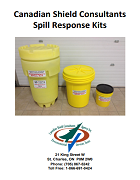Canadian Shield Consultants
Nutrient Management
Brought into effect as part of the Ontario government’s Clean Water Strategy, the Nutrient Management Act sets out province-wide standards to manage agriculture activities as they relate to nutrient use (manure). The legislation has the authority to establish province-wide standards for the management of nutrient materials and sets out requirements and responsibilities for farmers, municipalities and others in the business of managing nutrients.
Nutrient materials include manure, commercial fertilizers, biosolids generated by municipal sewage treatment and pulp and paper sludge. The use of these types of materials on land is governed by multiple legislative and regulatory provisions, guidelines, best management practices and in some instances municipal by-laws.
How is this different?
The Nutrient Management Act was developed by the Ministry of Agriculture and Food (OMAF) and the Ministry of Environment and Energy (MOEE). It:
• sets out a comprehensive and integrated approach to all land-applied materials and the safe disposal of deadstock;
• ensures that all land-applied materials will be managed in a sustainable, beneficial manner which results in • environmental and water quality protection;
• provides for clear, province-wide standards. And hopefully;
• increases public confidence in a sustainable future for agricultural and rural development.
What’s does the legislation include?
Under various categories of Nutrient Units (NU), this legislation sets out compliance dates between 2003 and 2008 for Ontario operations to develop and implement a Nutrient Management Plan (NMP) or Nutrient Management Strategy (NMS).
The Nutrient Management Plan (NMP) is a science-based tool identifying how manure, commercial fertilizers, other nutrients and existing soil fertility are effectively managed in an environmentally responsible manner. Different types of operations will have different requirements and eventually all land-applied materials containing nutrients will be managed according to NMPs. Generators of materials such as municipal biosolids and pulp and paper sludge, will be required to complete a Nutrient Management Strategy (NMS), which outlines how they are managing these types of materials.
The legislation also sets out the authority for clear enforcement. Provincial government officers who are experienced and knowledgeable in agriculture and the environment will have the authority to inspect and issue compliance and preventive orders. Municipal responsibilities will be clarified under the Act. New standards will replace the patchwork of municipal by-laws regarding nutrient management. Municipalities will have the Act as support for their continued responsibility for land use planning and building code approvals. The Act also allows for the creation of local advisory committees to promote awareness of the new rules, and mediate local nutrient management issues that are not related to enforcement.
The Act re-affirms the ultimate authority of the Environmental Protection Act, the Ontario Water Resources Act, Pesticides Act, and the Farming and Food Production Protection Act.
How will it work?
The Nutrient Management Act provides the authority to develop and implement new, enforceable standards, supported by inspection and compliance measures through provincial enforcement. The Act provides a framework for the Ministry of Agriculture and Food and the Ministry of Environment and Energy to work with a broad range of stakeholders to develop the specific standards.
It provides authority for regulations governing several areas, including:
• establishing requirements for NMPs and NMSs, including record keeping and filing;
• enhancing regulations for the use, quality and application of land applied nutrients;
• establishing minimum distance separation requirements for land application and buildings to protect land and water;
• establishing categories of agricultural operations and standards relating to the management of materials containing nutrients;
• establishing requirements for the collection, storage, handling, use and transportation of materials containing nutrients;
• establishing qualifications, education, training and certification for farmers and others applying materials containing nutrients to land;
• providing for the use, establishment and access to a registry in which NMPs/NMSs would be recorded;
• using innovative technologies (e.g. composting) to manage materials containing nutrients;
• and locally mediating issues that are not related to enforcement, including establishing local advisory committees.
How will it be implemented?
The Act provides for a framework to phase in standards over time, depending on the size of the operations and the kinds of practices that are carried out. Any number of sub-categories could also be defined to ensure that different types of operations would be regulated in the most effective way.
All farms will eventually be governed by new regulations which incorporate best management practices and standards for the management of materials containing nutrients.
The Act establishes authority for a range of new approval and review requirements designed to minimize environmental risks. These will be most stringent for large livestock operations, which will need provincial certification, including approval for their NMPs. These operations will be inspected by a team of provincial government staff who are knowledgeable in agriculture and the environment.
Mid-size livestock operations wanting to build or expand will be subject to a provincial review. As part of the review, these operations will be responsible for having up-to-date NMPs available for the inspection and review. The Act provides authority for several functions including the review and approval of NMPs, education, training and certification.
Education and training requirements are an integral part of the new legislation, so that farmers and others with new responsibilities will be well-equipped to adhere to its standards and regulations.
How can Canadian Shield Consultant Agency Inc. help?
In anticipation of the passing of the legislation setting out how the Nutrient Management Act – 2002 will be implemented, our agency has participated in the OMAF training and certification. The Operations Manager has had over 25 years of experience working with the agriculture industry and has been schooled in Agriculture Engineering practices.
To help bring provincial legislation or these new rules to the local farmer, we at Canadian Shield Consultants Agency Inc. are prepared to assist in the development of Nutrient Management Strategies (NMS) or Plans (NMP).
Source: http://canadianshieldconsultants.com/?page_id=98
